Cystitis in cats- Causes, symptoms and treatment
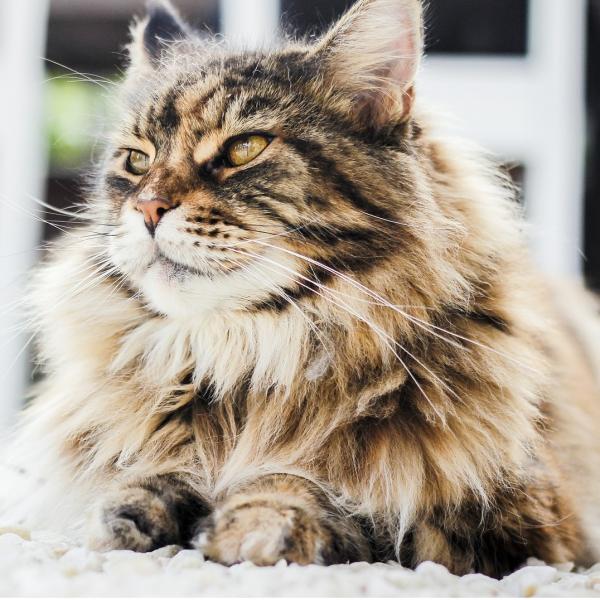
Cats, like us, can suffer diseases that affect their urinary tract. The cystitis It is one of the most common problems suffered by cats and can cause great discomfort if not treated properly.
It is a common but potentially dangerous disease, so every owner should know the symptoms of feline cystitis to act as soon as possible and avoid major problems. Sometimes a badly cured cystitis can become chronic and cause your cat to relapse every so often. In addition, it causes a lot of stress to the animal.
In this article you will know the causes, symptoms and treatment of cystitis in cats to act quickly and prevent the clinical picture from getting worse.
What is cystitis?
Cystitis is a disease that causes inflammation of the urinary bladder, so it is very similar to human cystitis. It may be caused by different causes, but the consequences are the same. It causes problems when urinating, it causes pain and can make the cat that suffers it very nervous. Likewise, go to the sandbox again and again but just pee. For all this, it is important to go to the veterinarian as soon as we observe the first symptoms.
La feline cystitis It is a common disease that with the right care can be overcome, but if complications arise it can cause big problems. If an obstruction of the urethra occurs and it is not treated, it will cause the death of the animal.
Causes of cystitis in cats
Cystitis in cats can be caused by several factors:
- Bacterial, viral or parasitic infection. Your veterinarian will determine by urinalysis the origin of the infection. Bacterial infections are the most common and will be treated with antibiotics.
- Bladder cancer. Bladder cancer or other tumors can cause urinary problems that lead to cystitis. Other symptoms will be present.
- Obesity. Obesity is not a cause in itself, but it can predispose your cat to urinary tract infections. Read our article “Prevent Obesity in Cats” and discover how to keep your cat at its ideal weight.
- Feline ideopathic cystitis. It is very difficult to diagnose this disease. It has a possible neurological origin. Normally when a cat has urinary problems but do not come from a normal infectious process, it is feline ideopathic cystitis. Before your veterinarian will rule out other causes. The symptoms are not caused by a bacterium or a pathogen. This type of cystitis is caused mainly by the Stress. For this reason it can be difficult to both diagnose and treat. It is important to control the animal’s environment, avoid stress and control that it drinks enough water.
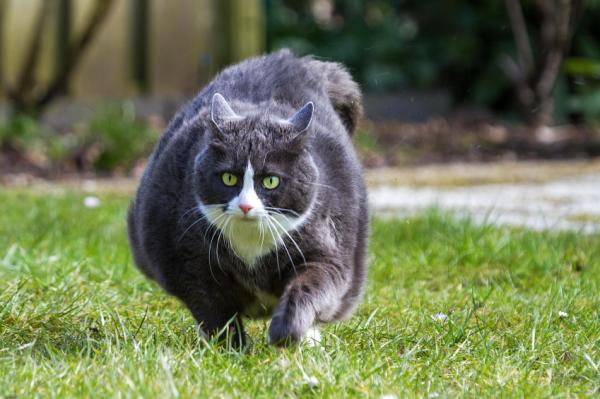
Symptoms of cystitis in cats
At first it can be difficult to determine the symptoms of feline cystitis. But, as it progresses, our cat will show more clearly the signs of this disease. That’s why it’s important to watch your cat behave strangely. The sooner we act, the better.
The symptoms of cystitis Most common in cats are the following:
- Pain when urinating: meows or shows signs of pain during interning.
- He licks the genital area more than usual.
- Polaquiuria: urinates many times but small amounts, sometimes just a few drops.
- Dysuria: urine with effort.
- Urinate out of the drawer.
If you notice that your cat does not urinate at all, it may be a obstruction of the urethra. It is produced by the formation of crystals in the urethra, and it usually occurs more frequently in male cats. When this happens, your cat, although it tries and makes effort, does not get to urinate anything. In these cases you should go immediately to your veterinarian.
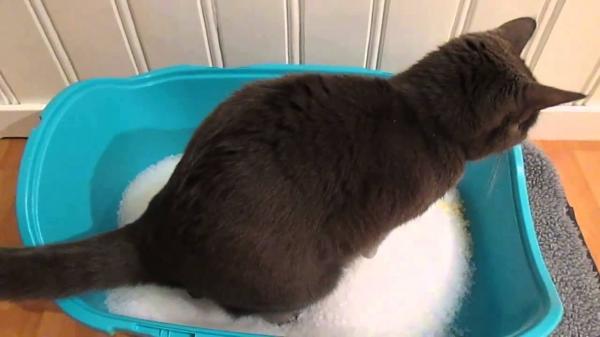
Treatment for feline cystitis
As soon as you take your cat to the veterinarian, he will perform a blood and urine test to determine the origin of the cystitis.
If it is a bacterial or viral infection it will be treated with Antibiotics. Respect the duration of the treatment advised by the veterinarian and do not medicate your cat on your own. It is very important not to leave the treatment halfway, although our cat is already well. If the infection does not heal well, relapses may occur.
During this period you must take care of your cat’s diet and keep it hydrated until it recovers.
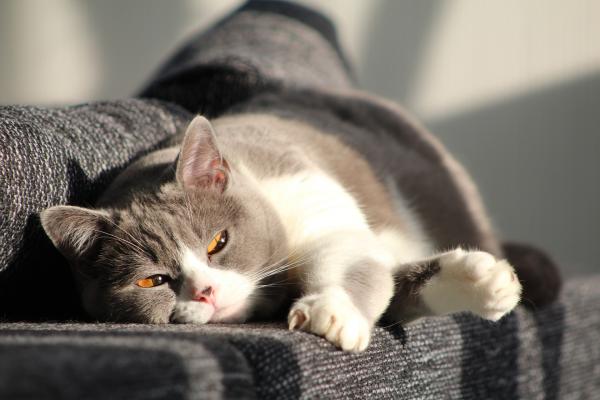
Prevention of cystitis in cats
La hygiene It is essential to avoid infectious problems such as feline cystitis. We should have the litter box as clean as possible and observe each time you change it that the stools and urination are correct. On the other hand, the place where the sandbox is should be aerated, accessible, with little humidity and away from other animals.
Cats with cystitis may have problems with sandboxes. Ideally for them is a wide and preferably open tray. Closed boxes with doors are usually harder to clean and some cats do not like to close themselves to urinate. You know your cat better than anyone, so choose the litter box that best suits him and keep it as clean as possible.
La hydration It is equally important to avoid urinary problems. They should always have fresh, clean water at their disposal. Leaving a cat for long periods without access to water can damage your kidneys.
If your cat goes outside and stays outside for hours. Place a container with water on the outside. Although cats look for alternatives to drink, it is always better to drink the clean water that we put.
If you want to know more about other diseases that may affect your cat, read our article Most common diseases of cats.
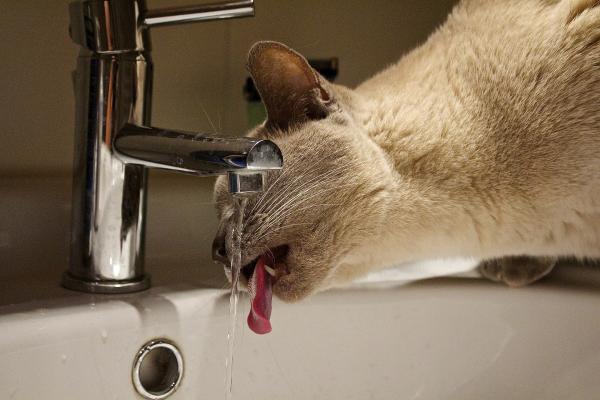
This article is merely informative, in .com we do not have the faculty to prescribe veterinary treatments or make any kind of diagnosis. We invite you to take your pet to the veterinarian in case of any type of condition or discomfort.
If you want to read more articles similar to Cystitis in cats- Causes, symptoms and treatment, we recommend that you enter in our section of Bacterial diseases.





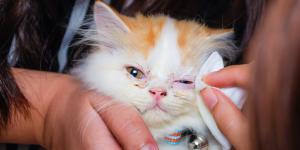
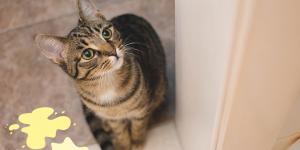





Hello Alfonso, I advise you to call your vet whenever you have doubts about the symptoms your cat experiences. I understand that today you have an appointment, I hope it is not serious.
Hello, I have a black cat of about 4, is sterilized, a few weeks ago I noticed that he has problems urinating, we have been taking him to the vet but without permanent improvements.
A few 4 days ago I saw him very desperate, the floor was full of sand and the cat lying down without moving, we took him urgently to a veterinary hospital, put a probe and took out urine, they told me that he had inflammation and urine retention, for two days with a probe.
The veterinarian told us that she did not find any residue in her urine, said it was cloudy but without blood.
He was also tested for AIDS and leukemia and was negative. He was examined and had a little anemia, we are giving him treatment, which is a desinflamant and antibiotic and a capsule, he told me that he could have a parasite in the blood that makes him anemic.
But they have not been able to tell me because they have problems urinating.
Today we did an ecosonogram and apparently there is nothing, the veterinarian told me I could have cystitis and one cause is stress, my other veterinarian tells me that it is not possible that (stress causes you not to urinate).
Coincidentally the problem we noticed when we brought another cat, (which I have to give it up for adoption, I am a bridge house), and this situation had never happened, since it is not the first one we have, and there are two veterinarians who tell me that It could be because of stress, because he feels invaded, and well, now where is the new cat, is where before my other cat went to the sandbox, that sandbox was only his but he had time to use the other one.
What worries me is that he is not doing what is necessary to take care of him, we change the sand and an extra sandpit for him.
When I put the sandbox urine, then he did it again, his postures were with some effort and little urine.
Then he went to bed in the sandbox and I took it out, then he went back to using it and made poop and urine, I do not know if it is a sign that part of the problem is, we have not stopped medicating him and treating him as he is.
You will have some other opinion and some recommendation.


